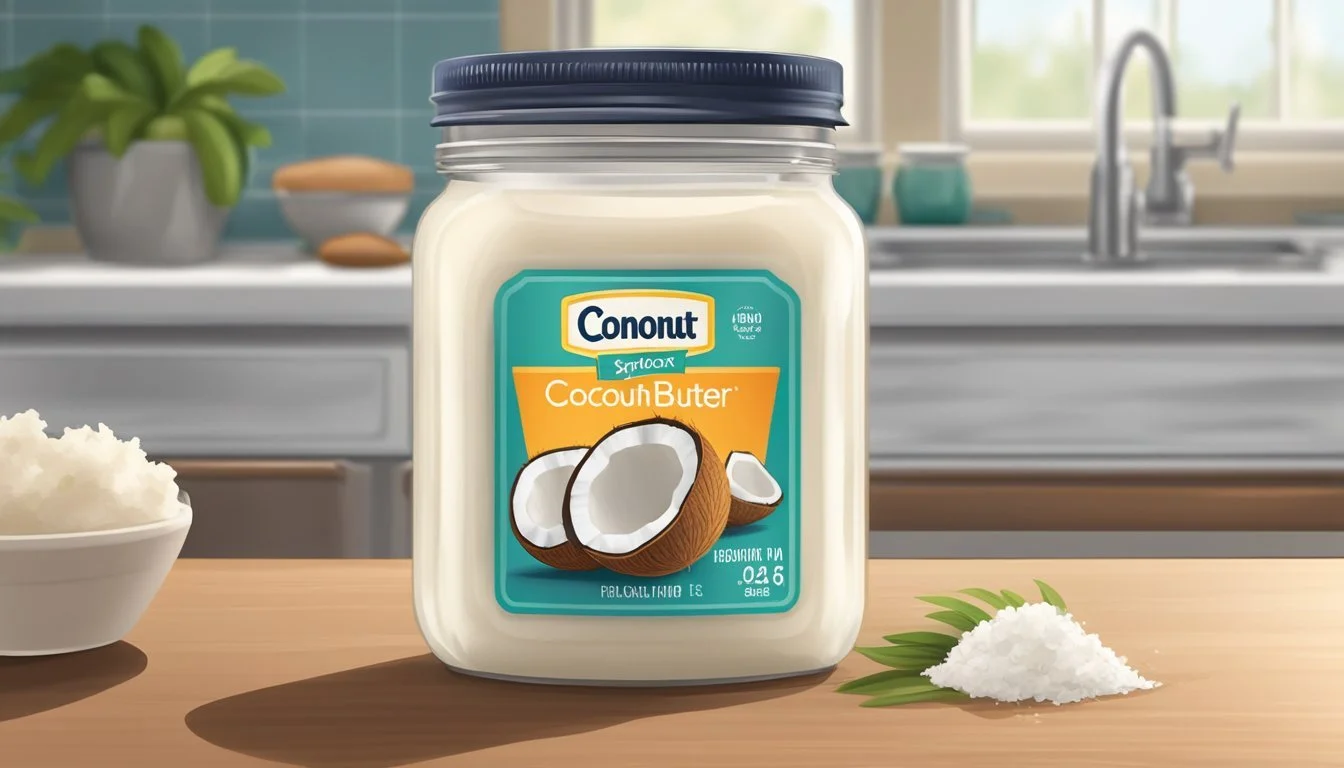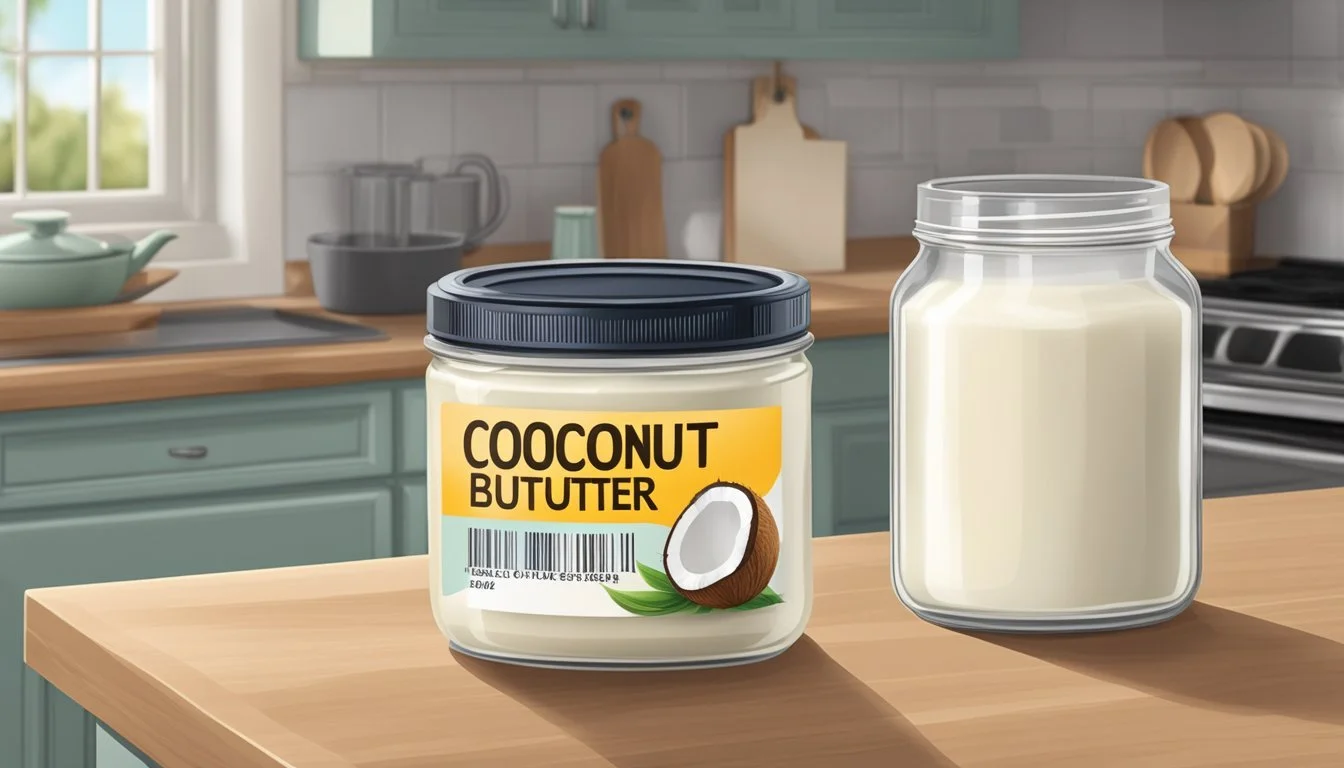Does Coconut Butter Go Bad?
Shelf Life and Storage Tips
Do you ever wonder if coconut butter goes bad? The simple answer is yes, coconut butter can go bad. When stored correctly, coconut butter can last a long time without spoiling, typically ranging from one year up to 15 months. Storage plays a crucial role in maintaining its quality. Keeping it in an airtight container at room temperature helps prolong its shelf life.
Coconut butter is relatively shelf-stable, and its quality depends significantly on proper storage. Once opened, it should be consumed within six to 15 months. Over time, signs that coconut butter has gone bad include changes in color, texture, or smell. These indicators are essential to watch for to ensure you’re using fresh coconut butter.
Knowing how to identify if coconut butter has spoiled can save your dishes from an unpleasant surprise. A rancid taste, oily smell, or a shift to a yellow or grey hue are clear signals that the coconut butter should be discarded. By understanding these signs and storing it properly, you can enjoy the full benefits of coconut butter for as long as possible.
Understanding Coconut Butter
Coconut butter is a versatile ingredient made from pureed coconut meat. It offers a range of health benefits and can come in various forms.
Composition and Types
Coconut butter is created by blending coconut meat until it forms a creamy, spreadable consistency. The primary components include natural oils and fibers from the coconut. Unlike coconut oil, which is extracted fat, coconut butter includes all parts of the coconut, making it richer in fiber and nutrients.
There are several types of coconut butter, including organic and unsweetened. Organic coconut butter is made from coconuts grown without pesticides, making it a preferred choice for those looking to avoid chemicals. Unsweetened varieties are popular for their pure, unadulterated flavor, suitable for both savory and sweet applications.
Benefits of Coconut Butter
Coconut butter boasts numerous health benefits. It contains healthy fats like medium-chain triglycerides (MCTs), which can provide quick energy and may support weight management. Additionally, the high fiber content aids in digestion and can promote a feeling of fullness, which may help in maintaining a healthy weight.
Organic coconut butter is often favored for its purity and absence of harmful additives. It's a source of valuable nutrients, including vitamins and minerals that support overall health. The natural oils in coconut butter can also promote skin health when used topically, making it a multipurpose product in both culinary and skincare routines.
Freshness Indicators
Coconut butter can exhibit several signs when it starts to go bad. Key indicators include changes in texture, smell, taste, and visual appearance.
Texture and Consistency
Fresh coconut butter has a creamy and smooth consistency. When it starts to go bad, the texture may change significantly. It can become chunky, grainy, or overly hard.
If it feels very gritty or has separated more than normal, it might be an indicator of spoilage.
Smell and Taste
The odor is a strong indicator of freshness. Fresh coconut butter should have a mild, sweet, nutty smell. If it starts to smell sour, rancid, or unusually strong, it’s likely spoiled.
In terms of taste, rancid butter will have a very off-putting flavor compared to its usual creamy, slightly sweet taste.
Visual Inspection
Inspecting the color can help determine if it is still good. Fresh coconut butter typically has a white to off-white color.
Discoloration such as yellowing or graying suggests spoilage. Additionally, any signs of mold growth indicate it’s no longer safe to consume.
Thus, always look for these visual clues.
Proper Storage Techniques
Proper storage of coconut butter can significantly extend its shelf life and maintain its quality. Important factors to consider include temperature, exposure to light, and the use of airtight containers.
At Room Temperature
Coconut butter can be stored at room temperature, ideally in a cool, dark place. Direct sunlight and heat sources can accelerate spoilage, so it’s best to keep it in a pantry or cupboard.
An airtight container is essential to minimize exposure to air, which can cause oxidation and rancidity. Consistent temperatures are key, so avoid placing coconut butter near ovens or other appliances that generate heat.
Refrigeration and Freezing
Storing coconut butter in the refrigerator can extend its shelf life significantly. When refrigerated, the butter might harden, making it less convenient to use. To counter this, simply allow it to come to room temperature before use.
Freezing coconut butter is another option for long-term storage. Use a freezer-safe, airtight container to prevent freezer burn and contamination. When needed, thaw it in the refrigerator first to preserve its texture and flavor.
Shelf Life and Expiration
Coconut butter has a relatively long shelf life if properly stored. This section highlights crucial aspects of understanding expiration dates, extending shelf life, and signs of spoilage.
Understanding Expiration Dates
Expiration dates are essential for assessing the freshness of coconut butter. Store-bought varieties typically have a "best-by" date, indicating when the product is expected to be at its peak quality.
Unopened coconut butter can last up to two years if kept in a cool, dry, and dark place. Once opened, it typically remains safe and usable for six to 15 months depending on storage conditions. Homemade coconut butter generally has a shorter shelf life due to the lack of preservatives.
Extending Shelf Life
Proper storage techniques can significantly extend the shelf life of coconut butter. Store coconut butter in an airtight container to prevent exposure to air, which can promote spoilage. Keep the container in a cool, dry location away from sunlight and heat sources.
Avoid moisture as it fosters bacterial growth. Some people choose to store coconut butter in the refrigerator to extend its longevity, although it can usually remain stable at room temperature when kept away from direct heat sources.
Signs of Spoilage
Identifying spoilage in coconut butter is key to ensuring it remains safe for consumption. Changes in color, texture, or smell are primary indicators. If the butter becomes unusually dark or develops a gritty texture, it may be rancid.
An off-putting smell, reminiscent of sour or stale odors, is another sign that the coconut butter has gone bad. Consuming rancid or spoiled coconut butter can lead to food poisoning or other health issues, so it’s crucial to discard any compromised product.
Usage and Applications
Coconut butter is a versatile ingredient that can be used in numerous culinary creations and non-culinary applications. It serves both as a flavorful addition to dishes and a beneficial component in skincare routines.
Culinary Applications
Coconut butter can be spread on toast, added to oatmeal, or used in smoothies for a rich, creamy texture. It also works well in baked goods as a substitute for regular butter, providing a slight coconut flavor that pairs well with desserts. In cooking, it can be mixed into sauces or melted and drizzled over foods like sweet potatoes.
Its ability to be used straight from the jar or blended into recipes makes it a flexible alternative to other nut butters.
Non-culinary Uses
In skincare, coconut butter is appreciated for its moisturizing properties. It can be applied directly to the skin to help with dryness or used in DIY beauty products like lip balms and lotions. Additionally, combining coconut butter with other oils can enhance its effectiveness.
Though primarily a food product, its utility in personal care makes it a popular choice for those looking to incorporate natural ingredients in their beauty regimen.
Distinguishing Similar Products
Coconut butter is often confused with other coconut-based and nut-based products. Each of these has its distinctive properties and uses, making it vital to understand their differences.
Coconut Butter vs. Coconut Oil
Coconut butter and coconut oil are derived from the same source – coconut meat – but they are quite different. Coconut butter is made from ground coconut meat, giving it a thick, spreadable consistency with both the oil and fiber of the coconut. It retains all parts of the coconut, making it rich and flavorful.
Coconut oil, on the other hand, is extracted from the meat and is purely fat. It remains liquid at warm temperatures and solidifies in cooler conditions. Unlike the spreadable coconut butter, coconut oil has a runny consistency and is used primarily for cooking and baking due to its high smoke point.
Coconut Butter vs. Other Nut Butters
Coconut butter differs significantly from peanut butter and other nut butters like almond butter. While peanut butter and almond butter are made from their respective nuts and are often creamy or chunky, coconut butter is denser and includes both oil and fiber of the coconut meat, giving it a unique texture.
Nut butters like cocoa butter are primarily fat and lack the fiber content found in coconut butter. Coconut butter can be more versatile in recipes that benefit from its distinct coconut flavor and texture. Coconut butter can also be a superior choice for those seeking organic and natural fat options.
Specialty Coconut Butters
Specialty coconut butters such as organic coconut butter or toasted coconut butter offer unique flavors and benefits. Organic coconut butter ensures that no pesticides or chemicals were used in the growing or processing stages, which can be appealing for health-conscious consumers.
Toasted coconut butter brings a different flavor profile to the table. It has a more intense, nutty taste due to the toasting process, enhancing various dishes. Specialty coconut butters also sometimes include additional ingredients like matcha, adding even more variety to the market.
Understanding these distinctions helps in making an informed choice based on culinary needs and personal preferences.
Frequently Asked Questions
Does coconut butter go bad?
Yes, coconut butter can go bad. While it is relatively shelf-stable, it eventually spoils, especially if not stored properly.
How can you tell if coconut butter has gone bad?
Bad coconut butter may change in color, texture, or smell. It can develop a rancid taste or smell very oily. Sometimes it turns yellow or grey.
How long does store-bought coconut butter last?
Store-bought coconut butter can last for 6 to 12 months unopened. Once opened, it typically remains good for 3 to 5 months.
What about homemade coconut butter?
Homemade coconut butter may have a shorter shelf life than store-bought. It can last for several months in an airtight container but should be checked regularly for signs of spoilage.
Should coconut butter be refrigerated?
Refrigeration is not required but can extend the freshness of coconut butter. Storing it in a cool, dark place is also effective.
What is coconut manna?
Coconut manna is another name for coconut butter. It has a creamy texture and can be used in various recipes.
Can you freeze coconut butter?
Yes, coconut butter can be frozen to prolong its shelf life. Ensure it is in an airtight container to prevent freezer burn.
What’s the best way to soften coconut butter?
Place the jar in a warm (not hot) oven for a few minutes or put it in a bowl of warm water. Do not use a microwave as it may alter the texture.







